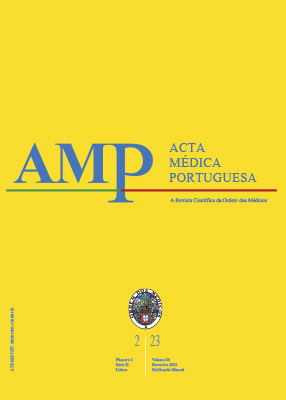A Case Series Study on Growth Hormone Therapy in Children with Prader-Willi Syndrome in Portugal
DOI:
https://doi.org/10.20344/amp.17559Keywords:
Child, Human Growth Hormone/therapeutic use, Portugal, Prader-Willi Syndrome/drug therapyAbstract
Introduction: Prader-Willi syndrome is a multisystemic genetic disorder associated with shorter adult height. Nowadays, all paediatric Prader-Willi syndrome patients are considered for growth hormone treatment. We present the experience of this treatment at a Portuguese paediatric endocrinology unit and intend to emphasise the importance of creating a follow-up national network of these patients.
Material and Methods: Longitudinal, retrospective, analytical study of Prader-Willis syndrome patients using data between 1989 and 2021. Growth hormone therapy was offered to eligible patients. The analysis included all Prader-Willis syndrome patients, with a comparison between treated and untreated patients; a longitudinal analysis of patients receiving growth hormone therapy (baseline, 12 and 36 months of follow-up) was also carried out. The statistical analysis was carried out using STATA® v13.0.
Results: Out of 38 patients with Prader-William syndrome, 61% were male. The median age at diagnosis was four months and 61% received growth hormone therapy. The patients who reached adulthood, or 18 years old, had a median near-adult height, Z-score of −2.71, and their median body mass index indicated class 2 obesity, regardless of growth hormone therapy. Patients had a lower body mass index in the growth hormone group (35 vs 51 kg/m2, p < 0.042) near-adult height.
Conclusion: This case series represents the first national study that included patients on growth hormone therapy after the National Health Service started supporting the treatment for Prader-Willi syndrome patients and supports its use, reinforcing the positive effects on growth and body mass index. Longer follow-up studies are needed to analyse the effect of growth hormone on patient metabolic profiling, body composition and cognitive level.
Downloads
References
Grugni G, Sartorio A, Crinò A. Growth hormone therapy for Prader-Willi syndrome: challenges and solutions. Ther Clin Risk Manag. 2016;12:873-81.
Aycan Z, Baş VN. Prader-Willi syndrome and growth hormone deficiency. J Clin Res Pediatr Endocrinol. 2014;6:62-7.
Angulo M, Abuzzahab MJ, Pietropoli A, Ostrow V, Kelepouris N, Tauber M. Outcomes in children treated with growth hormone for Prader-Willi syndrome: data from the ANSWER Program® and NordiNet® International Outcome Study. Int J Pediatr Endocrinol. 2020;2020:20.
Bridges N. What is the value of growth hormone therapy in Prader-Willi syndrome? Arch Dis Child. 2014;99:166-70.
Deal CL, Tony M, Höybye C, Allen DB, Tauber M, Christiansen JS. Growth hormone research society workshop summary: consensus guidelines for recombinant human growth hormone therapy in Prader-Willi syndrome. J Clin Endocrinol Metab. 2013;98:E1072-87.
Butler MG, Miller JL, Forster JL. Prader-Willi syndrome - clinical genetics, diagnosis and treatment approaches: an update. Curr Pediatr Rev. 2019;15:207-44.
Fenton TR, Kim JH. A systematic review and meta-analysis to revise the Fenton growth chart for preterm infants. BMC Pediatr. 2013;13:59.
WHO Multicentre Growth Reference Study Group. WHO Child Growth Standards based on length/height, weight and age. Acta Paediatr Suppl. 2006;450:76-85.
Burt VL, Harris T. The third National Health and Nutrition ExaminationSurvey: contributing data on aging and health. Gerontologist. 1994;34:486-90.
Singh P, Mahmoud R, Gold JA, Miller J, Roof E, Tamura R, et al. Multicentre study of maternal and neonatal outcomes in individuals with Prader-Willi syndrome. J Med Genet. 2018;55:594-8.
Bexiga V. Diagnóstico neonatal de síndrome de Prader-Willi. Acta Pediatr Port. 2010;41:30-2.
Tauber M, Hoybye C. Endocrine disorders in Prader-Willi syndrome: a model to understand and treat hypothalamic dysfunction. Lancet Diabetes Endocrinol. 2021;9:235-46.
Sedky K, Bennett DS, Pumariega A. Prader Willi syndrome and obstructive sleep apnea: co-occurrence in the pediatric population. J Clin Sleep Med. 2014;10:403-9.
Burman P, Ritzén EM, Lindgren AC. Endocrine dysfunction in Prader-Willi syndrome: a review with special reference to GH. Endocr Rev. 2001;22:787-99.
Muscogiuri G, Barrea L, Faggiano F, Maiorino MI, Parrillo M, Pugliese G, et al. Obesity in Prader–Willi syndrome: physiopathological mechanisms, nutritional and pharmacological approaches. J Endocrinol Invest. 2021;44:2057-70.
Downloads
Published
How to Cite
Issue
Section
License
Copyright (c) 2022 Acta Médica Portuguesa - Ordem dos Médicos

This work is licensed under a Creative Commons Attribution-NonCommercial 4.0 International License.
All the articles published in the AMP are open access and comply with the requirements of funding agencies or academic institutions. The AMP is governed by the terms of the Creative Commons ‘Attribution – Non-Commercial Use - (CC-BY-NC)’ license, regarding the use by third parties.
It is the author’s responsibility to obtain approval for the reproduction of figures, tables, etc. from other publications.
Upon acceptance of an article for publication, the authors will be asked to complete the ICMJE “Copyright Liability and Copyright Sharing Statement “(http://www.actamedicaportuguesa.com/info/AMP-NormasPublicacao.pdf) and the “Declaration of Potential Conflicts of Interest” (http:// www.icmje.org/conflicts-of-interest). An e-mail will be sent to the corresponding author to acknowledge receipt of the manuscript.
After publication, the authors are authorised to make their articles available in repositories of their institutions of origin, as long as they always mention where they were published and according to the Creative Commons license.









